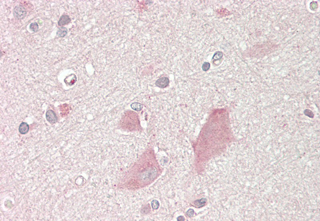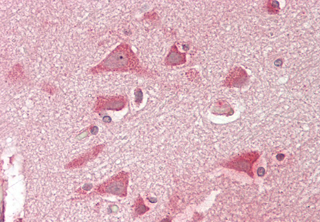NMNAT2 (human) (rec.) (His)
AG-40A-0153T
Protein IDQ9BZQ4
Product group Proteins / Signaling Molecules
Overview
- SupplierAdipoGen Life Sciences
- Product NameNMNAT2 (human) (rec.) (His)
- Delivery Days Customer10
- CertificationResearch Use Only
- Concentration0.1 mg/ml
- Estimated Purity>90%
- Gene ID23057
- Target nameNMNAT2
- Target descriptionnicotinamide nucleotide adenylyltransferase 2
- Target synonymsC1orf15, PNAT2, nicotinamide/nicotinic acid mononucleotide adenylyltransferase 2, NMN adenylyltransferase 2, NMN/NaMN adenylyltransferase 2, NaMN adenylyltransferase 2, nicotinamide mononucleotide adenylyltransferase 2, nicotinate-nucleotide adenylyltransferase 2, pyridine nucleotide adenylyltransferase 2
- Protein IDQ9BZQ4
- Protein NameNicotinamide/nicotinic acid mononucleotide adenylyltransferase 2
- Scientific DescriptionNicotinamide mononucleotide adenylyltransferase 2 (NMNAT2) catalyzes the formation of NAD+ from nicotinamide mononucleotide (NMN) and ATP. Can also use the deamidated form nicotinic acid mononucleotide (NaMN) as a substrate but with lower efficiency. NMNAT2 also catalyzes the reverse reaction, i.e. the pyrophosphorolytic cleavage of NAD+. It is highly expressed in brain, in particular in cerebrum, cerebellum, occipital lobe, frontal lobe, temporal lobe and putamen. NMNAT2 is also found in the heart, skeletal muscle, pancreas and islets of Langerhans. NMNAT2 is essential for axon growth and survival. Its loss from injured axons may activate Wallerian degeneration (axon degeneration induced by nerve injury), whereas NMNAT overexpression rescues axons from degeneration. - Protein. Human NMNA2 (aa 2-307) is fused at the N-terminus to a His-tag. Source: E. coli. Lyophilized in 55mM TRIS-Cl, pH 8.2, containing 150mM NaCl plus 0.025% CHAPS. Purity: >90% (SDS-PAGE). Nicotinamide mononucleotide adenylyltransferase 2 (NMNAT2) catalyzes the formation of NAD+ from nicotinamide mononucleotide (NMN) and ATP. Can also use the deamidated form nicotinic acid mononucleotide (NaMN) as a substrate but with lower efficiency. NMNAT2 also catalyzes the reverse reaction, i.e. the pyrophosphorolytic cleavage of NAD+. It is highly expressed in brain, in particular in cerebrum, cerebellum, occipital lobe, frontal lobe, temporal lobe and putamen. NMNAT2 is also found in the heart, skeletal muscle, pancreas and islets of Langerhans. NMNAT2 is essential for axon growth and survival. Its loss from injured axons may activate Wallerian degeneration (axon degeneration induced by nerve injury), whereas NMNAT overexpression rescues axons from degeneration.
- Storage Instruction-20°C,2°C to 8°C
- UNSPSC41116100
- SpeciesHuman



